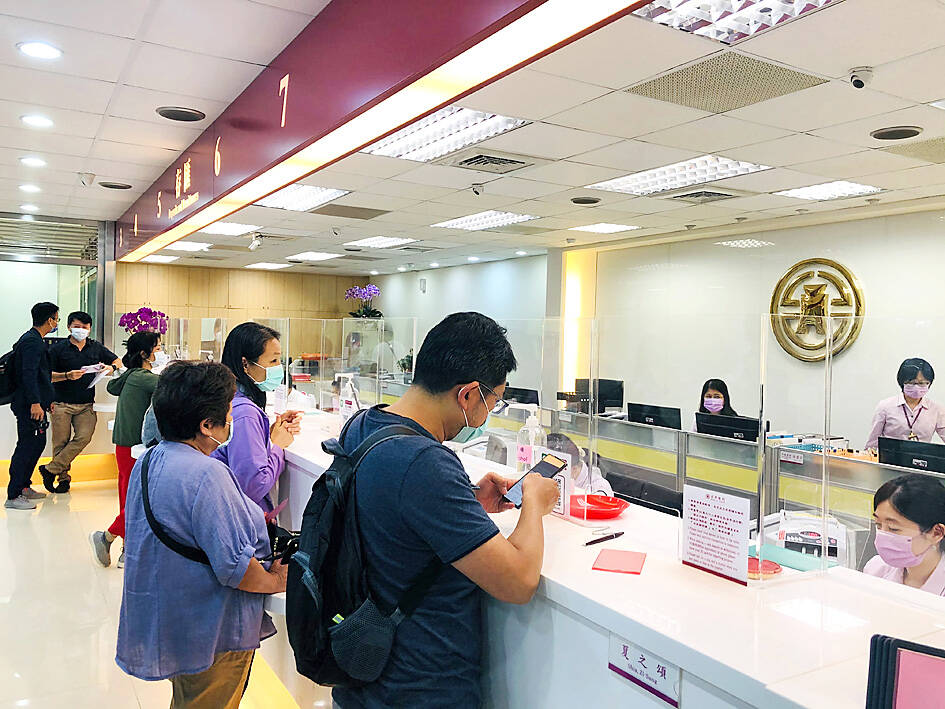Banks were the only segment in the local financial sector that reported growth in pretax profit from Jan. 1 to Aug. 31, thanks to the central bank’s rate hikes, the Financial Supervisory Commission said on Thursday.
Banks in Taiwan reported a combined pretax profit of NT$291.32 billion (US$9.2 billion) in the first eight months of the year, up 7.1 percent annually, as rate hikes drove up interest income, commission data showed.
Taiwanese banks’ pretax profit grew 9.3 percent from a year earlier to NT$267.3 billion in the eight months, the highest for the period on record, while credit co-operatives’ pretax profit rose 12.6 percent to NT$2.64 billion, commission data showed.

Photo: Kelson Wang, Taipei Times
However, foreign banks’ local units saw pretax profit drop 11 percent to NT$9.88 billion, as funding costs increased amid widening interest spreads between the US and Taiwan, the commission said.
Securities companies’ combined pretax profit decreased 59.19 percent to NT$35.62 billion in the first eight months, as fee income was dented by declining turnover in the local stock markets, the data showed.
Meanwhile, futures companies’ pretax profit dropped 0.7 percent to NT$3.43 billion, and investment trust firms’ pretax profit fell 9.76 percent to NT$9.39 billion, as investors became conservative about investments, the commission said.
Securities and Futures Bureau Deputy Director Kao Ching-ping (高晶萍) said the turnover in local stock markets shrank by NT$29.76 trillion in the first eight months after the TAIEX fell by 3,123.4 points during the period, causing the brokerage and proprietary trading businesses to see their income reduce by NT$37.86 billion and NT$30.67 billion respectively.
As for the investment trust firms, their asset management business declined to NT$4.76 trillion over the eight months, compared with NT$4.84 trillion in the same period last year, which affected fund managers’ fee income, Kao said.
Life insurance companies’ combined pretax profit dropped 22 percent to NT$264.3 billion, as investment income plunged amid market routs and rate hikes worldwide, while non-life insurance companies reported combined net losses of NT$76.5 billion due to sizable payments to COVID-19 insurance policyholders, the data showed.
Overall, financial companies in Taiwan reported a combined pretax profit decline of 27.7 percent year-on-year to NT$527.56 billion in the first eight months, the commission said.

To many, Tatu City on the outskirts of Nairobi looks like a success. The first city entirely built by a private company to be operational in east Africa, with about 25,000 people living and working there, it accounts for about two-thirds of all foreign investment in Kenya. Its low-tax status has attracted more than 100 businesses including Heineken, coffee brand Dormans, and the biggest call-center and cold-chain transport firms in the region. However, to some local politicians, Tatu City has looked more like a target for extortion. A parade of governors have demanded land worth millions of dollars in exchange

An Indonesian animated movie is smashing regional box office records and could be set for wider success as it prepares to open beyond the Southeast Asian archipelago’s silver screens. Jumbo — a film based on the adventures of main character, Don, a large orphaned Indonesian boy facing bullying at school — last month became the highest-grossing Southeast Asian animated film, raking in more than US$8 million. Released at the end of March to coincide with the Eid holidays after the Islamic fasting month of Ramadan, the movie has hit 8 million ticket sales, the third-highest in Indonesian cinema history, Film

Taiwan Semiconductor Manufacturing Co’s (TSMC, 台積電) revenue jumped 48 percent last month, underscoring how electronics firms scrambled to acquire essential components before global tariffs took effect. The main chipmaker for Apple Inc and Nvidia Corp reported monthly sales of NT$349.6 billion (US$11.6 billion). That compares with the average analysts’ estimate for a 38 percent rise in second-quarter revenue. US President Donald Trump’s trade war is prompting economists to retool GDP forecasts worldwide, casting doubt over the outlook for everything from iPhone demand to computing and datacenter construction. However, TSMC — a barometer for global tech spending given its central role in the

Alchip Technologies Ltd (世芯), an application-specific integrated circuit (ASIC) designer specializing in server chips, expects revenue to decline this year due to sagging demand for 5-nanometer artificial intelligence (AI) chips from a North America-based major customer, a company executive said yesterday. That would be the first contraction in revenue for Alchip as it has been enjoying strong revenue growth over the past few years, benefiting from cloud-service providers’ moves to reduce dependence on Nvidia Corp’s expensive AI chips by building their own AI accelerator by outsourcing chip design. The 5-nanometer chip was supposed to be a new growth engine as the lifecycle